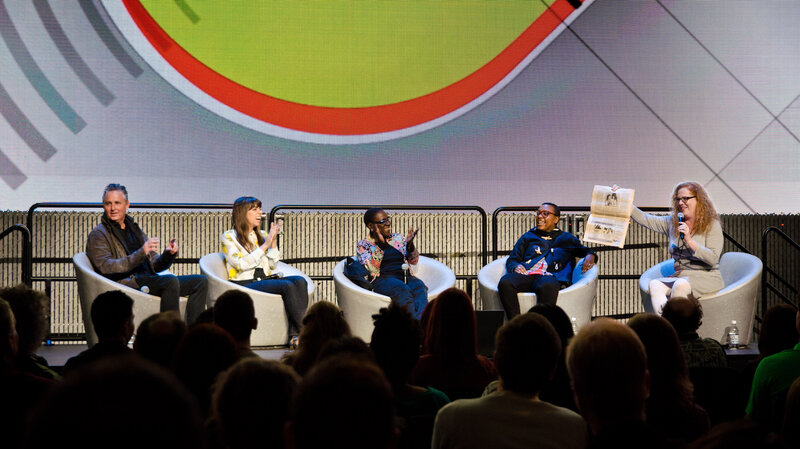“But I wanted to amplify critical dimensions of that popular piece so that they would resonate in academic circles and be understood as part of these longer debates that you and I have been immersed in, in Black studies, theater and performance studies, and American studies for many, many years now. I wanted to raise the stakes of how we understand the importance of popular music as an objective, serious and rigorous inquiry. And there were plenty of other people who were doing that, especially at EMP [the Experience Music Project annual conference, now called PopCon] in Seattle. That space was so important for helping me cultivate a different kind of voice and experimentalism in my writing. It’s important for our students to know that there are multiple spaces where we can flex our creative muscles in a variety of different contexts.” (Daphne Brooks)
As a student, I attended a number of MOPOP Conferences which Daphne Brooks addresses in her interview with Paige McGinley. The 2010 POP Conferences began with a
Call for Proposals
The Pop Machine: Music and Technology
Experience Music Project|Science Fiction Museum and Hall of Fame
Seattle, April 15-18, 2010
Papers from academics, lawyers, musicians, producers, and performers presented their work at the Conference. 2010 was kicked off by NPR Ann Powers moderates “Making Technology Bounce: An Artist-Producer” with musicians
Nel Rogers https://www.youtube.com/watch?v=A51p3gcCuOk
The next MO POP Conference, “Go Music Mobility”, took place in April 2014. Professors Michele Habell-Pallan and Organizer, Eric Weisbard graciously allowed their photos to be taken with me.
The opening keynote was moderated by Ann Powers. The Discussions centered on “You Gotta Move: Artists Talk About Life on the Road and Music in Motion"
Ann Powers (right) interviews musicians (from left) Mike McCready of Pearl Jam, Alynda Lee Segarra of Hurray for the Riff Raff, Sharon Jones and Meshell Ndegeocello reveal what it is like to live out of a suitcase, on the road, in performance while in the process of creating a new fresh sound. (The Interview can be head on NPR Podcast https://www.npr.org/sections/therecord/2014/04/30/307668364/hear-four-musicians-talk-about-what-moves-them)
POP conference runs three days beginning with Keynote. On the second day I attended Roundtable: "Girl in a Coma Tweets Chicana Futurism" which included Michelle-Habell Pallan, Sonnet Retman, Nichole Robert, and Faith Radle. Discussion leaders, Professors Retman and Habell-Pallan, interviewed through Technology Girl in a Coma. Some of the questions raised were the groups use of social technologies in the context of shrinking support for artists. The subject that they spoke to was new terrine for me. I assumed if the Performer was good they would make their way to the top. What it took from each one was technical & Professional Music ingenuity to be heard and be heard loudly.
Ann Powers (right) interviews musicians (from left) Mike McCready of Pearl Jam, Alynda Lee Segarra of Hurray for the Riff Raff, Sharon Jones and Meshell Ndegeocello reveal what it is like to live out of a suitcase, on the road, in performance while in the process of creating a new fresh sound. (The Interview can be head on NPR Podcast https://www.npr.org/sections/therecord/2014/04/30/307668364/hear-four-musicians-talk-about-what-moves-them)
POP conference runs three days beginning with Keynote. On the second day I attended Roundtable: "Girl in a Coma Tweets Chicana Futurism" which included Michelle-Habell Pallan, Sonnet Retman, Nichole Robert, and Faith Radle. Discussion leaders, Professors Retman and Habell-Pallan, interviewed through Technology Girl in a Coma. Some of the questions raised were the groups use of social technologies in the context of shrinking support for artists. The subject that they spoke to was new terrine for me. I assumed if the Performer was good they would make their way to the top. What it took from each one was technical & Professional Music ingenuity to be heard and be heard loudly.
It was Sherrie Tucker (center) who brought humanities and science together. She shared what she has learned as a “member of the ongoing collaborative AUMI Research Project, including how it challenged her exclusive relationship with jazz as an object of study, and pivoted her jazz studies questions and methods toward explorations of inclusive mixed-ability listening, sounding and sociality. Participants are invited to bring laptops, iPads or iPhones (sorry, Android users), if they wish. Those who want to try the AUMI in advance may download it free of charge


No comments:
Post a Comment